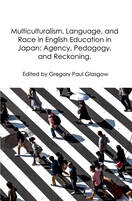Chapter 1: Constrained Agency: Language, Race, and the Paradox of Multiculturalism in English Education in Japan by Gregory Paul Glasgow
Abstract
The central goal of this chapter is to present a conceptual frame for the edited volume Multiculturalism, Language, and Race in English Education in Japan. Drawing on concepts from critical realism and raciolinguistics, I explore whether English education in Japan truly represents the language as a tool for multiculturalism and genuine intercultural communication by examining inequities in the state education system and the private language teaching industry. The English language in Japan is still perceived to be the property of White, Inner Circle first-language users, perpetuated by the raciolinguistic ideology of native-speakerism, which subjects educators who do not fit those categories to differential treatment throughout the system, affecting their agency and empowerment. Furthermore, social structures and cultural attitudes towards ownership of English may privilege some educators over others, leading to further stratification and inequity in pedagogical practices. These problems signify more broadly conflicting motivations in Japan’s efforts to “globalize” or “internationalize” through increased engagement with the West and adherence to cultural nationalism, rather than promoting genuine multiculturalism in education at the national level.
About the Contributor
Gregory Paul Glasgow holds a Ph.D. in Applied Linguistics from the University of Queensland, Australia, and he is currently an Associate Professor at Kanda University of International Studies in Chiba Prefecture. He co-edited the volumes Agency in Language Policy and Planning: Critical Inquiries and Researching Agency in Language Policy and Planning (with Jeremie Bouchard), published by Routledge. His research draws on critical applied linguistics and social theory to examine issues in language-in-education policy, language management, and the politics of Global Englishes in TESOL. Dr. Glasgow is also interested in second language teacher education (SLTE), and ELT practices that promote multiculturalism, equity, intercultural awareness, and social justice.
Citation
Glasgow, G. P. (2023). Constrained agency: Language, race, and the paradox of multiculturalism in English education in Japan. In G. P. Glasgow (Ed.), Multiculturalism, language, and race in English education in Japan: Agency, pedagogy, and reckoning (pp. 23–79). Candlin & Mynard. https://doi.org/10.47908/26/1
The central goal of this chapter is to present a conceptual frame for the edited volume Multiculturalism, Language, and Race in English Education in Japan. Drawing on concepts from critical realism and raciolinguistics, I explore whether English education in Japan truly represents the language as a tool for multiculturalism and genuine intercultural communication by examining inequities in the state education system and the private language teaching industry. The English language in Japan is still perceived to be the property of White, Inner Circle first-language users, perpetuated by the raciolinguistic ideology of native-speakerism, which subjects educators who do not fit those categories to differential treatment throughout the system, affecting their agency and empowerment. Furthermore, social structures and cultural attitudes towards ownership of English may privilege some educators over others, leading to further stratification and inequity in pedagogical practices. These problems signify more broadly conflicting motivations in Japan’s efforts to “globalize” or “internationalize” through increased engagement with the West and adherence to cultural nationalism, rather than promoting genuine multiculturalism in education at the national level.
About the Contributor
Gregory Paul Glasgow holds a Ph.D. in Applied Linguistics from the University of Queensland, Australia, and he is currently an Associate Professor at Kanda University of International Studies in Chiba Prefecture. He co-edited the volumes Agency in Language Policy and Planning: Critical Inquiries and Researching Agency in Language Policy and Planning (with Jeremie Bouchard), published by Routledge. His research draws on critical applied linguistics and social theory to examine issues in language-in-education policy, language management, and the politics of Global Englishes in TESOL. Dr. Glasgow is also interested in second language teacher education (SLTE), and ELT practices that promote multiculturalism, equity, intercultural awareness, and social justice.
Citation
Glasgow, G. P. (2023). Constrained agency: Language, race, and the paradox of multiculturalism in English education in Japan. In G. P. Glasgow (Ed.), Multiculturalism, language, and race in English education in Japan: Agency, pedagogy, and reckoning (pp. 23–79). Candlin & Mynard. https://doi.org/10.47908/26/1

Information About the Book
Title: Multiculturalism, Language, and Race in English Education in Japan: Agency, Pedagogy, and Reckoning
Editor: Gregory Paul Glasgow
Publication date: March 2023
Read more...
Title: Multiculturalism, Language, and Race in English Education in Japan: Agency, Pedagogy, and Reckoning
Editor: Gregory Paul Glasgow
Publication date: March 2023
Read more...
